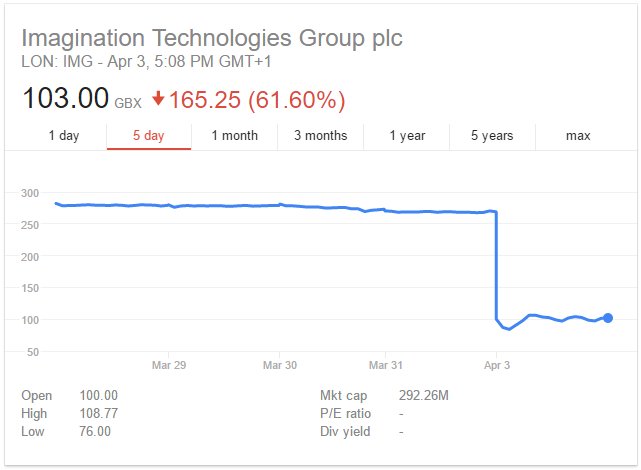If you're a supplier of a key component for iPhones that sell tens of millions every quarter, you can be sure that you'll do well. But once Apple stops being interested in you, you have a problem. The graphics chip manufacturer Imagination Technologies cost exactly such an experience roughly half a billion dollars. The value of the company fell by that much after the sharp drop in the shares.
Imagination Technologies in a Monday press release they wrote, that Apple told them it would stop buying their GPUs for its products, namely iPhones, iPads, TVs, Watch and iPods, "within 15 to 24 months." At the same time, Apple has been purchasing graphics processors from the British company for many years, so this change in strategy is very significant.
After all, this is evidenced by the already mentioned huge drop in the share price, which shows what a difference it is when you trade with Apple and when you don't. And that for Imagination Technologies, the Californian giant was indeed a key client, as it provided roughly half of their revenues. The future of the British GPU manufacturer may therefore be uncertain.

Apple's fifth chip
Apple's plan to start designing its own GPU after the CPU is not too surprising, however. On the one hand, it fits into Apple's strategy to control the development and eventually the production of the largest possible percentage of components in iPhones and other products, and on the other hand, in recent years, it has assembled one of the most respected "silicon" teams, to which it has intensively hired experts for graphics processors as well.
To Apple's chip-making team, which led by John Srouji, several key managers and engineers came from Imagination Technologies in recent months, and there was even speculation about whether Apple would buy the entire British company. He abandoned this plan for the time being, but given the significant drop in shares, it is possible that Apple's management will return to this idea.
After the A-series, S-series (Watch), T-series (Touch Bar with Touch ID) and W-series (AirPods) chips, Apple is now about to step into the next "silicon" area and its goal will clearly be similar success to its own CPUs. when, for example, the latest A10 Fusion is far from the competition. The chips that Google or Samsung put in their phones often can't even measure up to the even older A9 chip from 2015.

Competition beware
However, the development of the graphics processor is among the most complicated of all chips, so it will be very interesting to see how Apple deals with this challenge. Even considering that it should introduce its own GPU within two years at the latest, according to Imagination Technologies. For example, John Metcalfe, who worked for the British company for fifteen years, most recently as operations director, and has been working in Cupertino since last July, is helping with development.
In addition, the problem may arise not only with the development as such, but especially with the fact that most of the important patents in the field of graphics processors have already been dismantled, and Apple will need to secure intellectual property rights. This is also why he should have considered buying Imagination Technologies, and that is why analysts do not completely rule out this move in the future. With the acquisition, Apple would secure everything important it would need to release its own GPU.
If in the end Apple is really not interested in Imagination Technologies, the British do not want to give up without a fight and hope that they can at least collect royalties from Apple for their patented technologies, even if they have to go to court. "Imagination believes it would be extremely challenging to design an entirely new GPU architecture from the ground up without infringing its intellectual property," the firm said. For example, a licensing agreement with ARM appears to be another option for Apple.

Own GPU as the key to the future
However, what will ultimately be most important in relation to the GPU itself is the reason why Apple is doing it. "While on the surface it's all about phones, the fact that (Imagination) Apple is leaving them means that Imagination will be outside of anything Apple does going forward," he told Financial Times analyst Ben Bajarin from Creative strategies.
"The GPU is key as the most important component for all the interesting things they want to do in the future," Bajarin added, referring to things like artificial intelligence, facial recognition, autonomous vehicles, but also augmented and virtual reality.
Graphics processors are more suitable for individual and very resource-intensive tasks, in contrast to more generally focused CPUs, and that is why engineers use them, for example, when working with artificial intelligence. For Apple, its own, potentially more powerful and efficient GPU could provide even greater possibilities for processing data directly on the devices, as the iPhone manufacturer tries to process as little data as possible in the cloud for greater security.
In the future, the own GPU can understandably represent advantages in the aforementioned areas of augmented and virtual reality, in which Apple is already investing a large amount of money.
Apple is soon "buy below the price". Ps: managers will not make the chip.